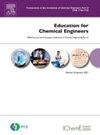EUR-ACE accreditation for chemical engineering in Spain: Current situation, lessons learned and challenges
Abstract
The accreditation of engineering programmes is a subject of great interest in the last decades. However, most studies in the literature are focused on case studies or deal with the different levels of acceptance of the groups involved in the accreditation. There are two main approaches for the accreditation of engineering programmes, i.e., at national or international level. Whereas most developed countries have established national standards for the quality assurance of the university studies, international accreditation systems for engineering studies are limited to 3 alternatives. The interaction between national and international accreditation systems is poorly understood despite of their significance in the design and management of the programme. We aim to fill in this gap and provide useful guidance for universities aiming to apply for the EUR-ACE® label in their chemical engineering programmes (bachelor or master). In general, there is a high level of complementarity between the Spanish and EUR-ACE accreditation systems. However, there are still challenges. For instance, the ad hoc procedure proposed by the national accreditation agency in Spain does not fully consider chemical engineering as a traditional branch of engineering. In addition, the changes in the Spanish accreditation system might negatively impact the current ad hoc procedure for EUR-ACE accreditation for some universities. The incorporation of IChemE in the accreditation process would be an option to deal with this issue.

 求助内容:
求助内容: 应助结果提醒方式:
应助结果提醒方式:


